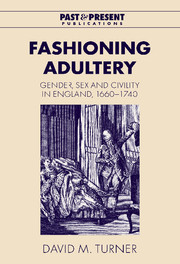Book contents
- Frontmatter
- Contents
- Acknowledgements
- Note on the text
- List of abbreviations
- Introduction
- 1 Language, sex and civility
- 2 Marital advice and moral prescription
- 3 Cultures of cuckoldry
- 4 Sex, death and betrayal: adultery and murder
- 5 Sex, proof and suspicion: adultery in the church courts
- 6 Criminal conversation
- Conclusion
- Bibliography
- Index
- Past and Present Publications
Introduction
Published online by Cambridge University Press: 01 July 2009
- Frontmatter
- Contents
- Acknowledgements
- Note on the text
- List of abbreviations
- Introduction
- 1 Language, sex and civility
- 2 Marital advice and moral prescription
- 3 Cultures of cuckoldry
- 4 Sex, death and betrayal: adultery and murder
- 5 Sex, proof and suspicion: adultery in the church courts
- 6 Criminal conversation
- Conclusion
- Bibliography
- Index
- Past and Present Publications
Summary
On 4 February 1674 Herbert Croft, Bishop of Hereford, delivered a Fast Day sermon to the assembled House of Lords. In keeping with the spirit of gloomy self-reflection and calls for repentance and reform that such occasions demanded, his text offered dire warnings of the spread of debauchery and vice. ‘Fornication and Adultery’, Croft lamented, were ‘not only frequently acted in private but publickly owned’, their perpetrators openly bragging about their conquests. Although he conceded that sexual sins were no new thing, they were now conducted in a particularly scandalous manner. While adulteries had once been committed in the ‘dark’ and men had ‘formerly skulkt into lewd houses, and there had their revellings’, nowadays, ‘men, married men, in the light, bring into their own Houses most lewd Strumpets, feast and sport with them in the face of the sun’. In the meantime, their ‘neglected, scorned, disconsolate wives’ were ‘forc'd to retire to their secret closets, that they be not spectators of these abominations’. Rippling out from the court, where the debauches of ‘grandees’ set a bad example copied by their inferiors, the forces of ‘lewdness and atheism’ threatened to engulf the land. Wherever one looked, concluded the bishop, it was as though civilised Englishmen had ‘metamorphosed themselves into lascivious goats’.
Invectives against the depravity of the times are a feature of many societies at many historical moments.
- Type
- Chapter
- Information
- Fashioning AdulteryGender, Sex and Civility in England, 1660–1740, pp. 1 - 22Publisher: Cambridge University PressPrint publication year: 2002



